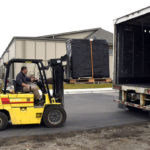Correction to Missoulian article: Beetle-kill drives value for Missoula wood-products business
Posted: December 6, 2016We are not the largest producer of Fir flooring in the world, however we have the largest selection of Prefinished Fir Flooring in the world at 32 options. There are other producers of unfinished Fir flooring in Montana that do a wonderful job as well, we have simply carved out a nice valued added niche with all our Prefinished options. We stand strong with other wood manufactures in Montana fighting for the same goal; improve the health of our forests while providing good paying quality jobs.
Source: Missoulian by Rob Chaney

Tom Bauer –Missoulian
In winemaking, there’s a condition called “noble rot” where moldy grapes produce some of the priciest juice.
Ryan Palma has found a similar bounty in Montana’s beetle-killed, fungus-stained pine forests. Picking at a friable seam of rotten heartwood in a huge Ponderosa pine plank, he explained that the defect that made the tree useless for lumber makes it sought after for a high-end living room table.
“When that wood gets too old, it starts to rot and split and check and crack,” Palma said. “For us, that just adds to the texture.”
The customers of Ryan Palma’s Sustainable Lumber Co. particularly demand beetle-killed pine, preferring its exotic blue hues. His Missoula showroom offers pine and fir flooring panels in eight shades on three surfaces, from smooth to hand-gouged. While those tree species are known as “softwood,” the dings, dents and scratches that occur naturally or by Palma’s preparation process make it more desirable than many “hardwood” species like beech oraspen.
“The industry’s changed a lot in the last 20 years,” said Palma, who many Missoulians remember as the University of Montana Grizzly football free safety in the 1995 national championship team. “I used to sell boxcars of lumber to distributors, who sold it to retailers, who sold it to builders. Now I’m the largest producer of fir flooring in the world, and it’s a 100 percent made-in-Montana product.”
Palma’s six-year-old company employs just one or two loggers who cut trees on order and send them to a Mennonite community for the hand-finishing work. About 40 people there hand-surface, dye and shape the wood into flooring and paneling. Sustainable Lumber also makes surfaces for cabinets and other custom fittings, but limits that work to local customers.
Palma said 90 percent of his inventory ships out of state. Last Wednesday, he loaded seven pallets of finished fir into a Fed Ex truck for delivery to an internet start-up company in Brooklyn, New York.
“A lot of the lumber industry is a dinosaur, not willing to change,” Palma said. “We’re doing things nobody in the lumber industry was doing. I’m building a 3-D showroom on the website so people can virtually walk through and see everything we have. It builds validity that we’re a real company, not some internet broker.”
Innovative wood products have made a significant dent in the traditional lumber market pie chart. On Nov. 14, Alaska Airlines flew a passenger jet from Seattle to Washington, D.C. on a tank of 20 percent biofuel made from wood pulp. An Oregon company produces sheets 12 feet wide, 48 feet long and 2 feet thick. They compete with concrete slabs for skyscraper construction, with the potential to support commercial buildings six to 10 stories tall.
But while Palma may need a single beetle-killed Ponderosa pine for a custom table order, he said he depends on Montana’s existing 10 large sawmills for the hundreds of thousands of board-feet of Douglas fir he uses for flooring.
“We’re trying to use technology where nobody else in the industry really is right now,” Palma said. “But we still need that mill infrastructure to stay in place, not only for us but for the overall health of the forest.
